Purpose The purpose of this studied to improve athletes’ performance through sports psychological skills training and counseling of a male canoe player in high school. Methods One male high school athlete in J area was interviewed for sports psychological skills training and counseling, and interviewed athletes and coaches diagnosed the potential psychological problems of athletes. Through this process, the athlete gained the ability to control anxiety about the game and strengthened the attention-focused ability to increase his confidence and set a goal for improving concentration. For effective training, sports psychological counselors, athletes, and coaches met once a week to create a routine. and participated in direct training on a boat with the coach every week. Sports psychological skills, anxiety about competition, and self-management of athletes were measured before and after to confirm the effectiveness of training of athletes' psychological skills. Results As a result, athletes' psychological skills and anxiety decreased, their confidence increased, and their concentration, which was diagnosed as an urgent problem of athletes, improved. Conclusions psychological skills of athletes, psychological shortcomings of players were reinforced, thus enhancing the athletes' performance. This suggests the effectiveness and necessity of training in sports psychological skills. It is hoped that continued support will serve as an opportunity to diagnose potential psychological problems of student athletes and apply them to training to contribute to improving their performance.
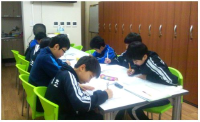
The purpose of this study was to verify the effect on elementary school students in the exercise start stage by performing a sport psychological skill training to improvement of psychological skill and life skill. Participants were eight elementary school boys volleyball player. The program consisted of psychological skills and life skills in educational counseling model of Visek et al(2009). It was conducted 40-50 minutes a session in total for 22 sessions. Data was collected through a psychological test, worksheet and participant observation, in-depth interviews. The collected data was analyzed to verify difference by paird t-test after pre-middle-post test and to extract meaningful data category. Quantity analysis showed that a result of sport psychological skill test proved a significant difference in willingness to overcome, confidence, concentration, anxiety regulation. Life skill test were no significant differences in all factors. However, the rise of scores was observed on result of the pre-middle paired t-test of life skill during season. Quality analysis showed possibility of goal setting, concentration on the routine, decrease of competitive anxiety, increase of positive thinking, self-understanding and understanding of others, promotion of communication among team members. This sport psychology skill training had a significant effect on the psychological skills of elementary players change. But it seems to be necessary life skills in a more through review of the information.


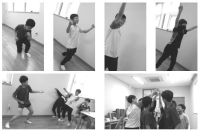
PURPOSE This study compares the effects of video group and metaverse group counseling for student athletes to analyze differences in immersion, sychological skills learning effects, and each approach’s participation experiences. METHODS Twenty-four high school archery students were divided into three groups: a metaverse experimental, a video comparison, and a control group. For the experimental and comparative groups, 10 non-face-to-face psychological skills training sessions were conducted. With the control group, results were compared and analyzed by measuring psychological skills and social presence pre- and post-training. Additionally, analysis of the qualitative effects of psychological skills training was performed. RESULTS The psychological skill test’s quantitative analysis of the video comparison group showed a more significant effect in anxiety control factors than the metaverse experimental and the control groups. Moreover, in the social presence test, both the metaverse and the video groups showed significant differences in social presence and satisfaction; furthermore, Scheff post-verification results showed that the two environments’ satisfaction was significantly higher than that of the control group. Qualitative analysis confirmed that the metaverse and video groups experienced psychological, technical, and relational changes in common. CONCLUSIONS Although the metaverse group using avatars was likely to increase immersion, both the video and the metaverse groups were effective in psychological skills training, suggesting that the training effect may vary depending on the non- face-to-face environment’s stability and participation method. Future studies should examine effects of applying the metaverse platform to sports psychological skills training and various psychological support activities by solving the metaverse environment’s technical limitations.
The purpose of this study was to examine psychological capital acquisition through Asian Games Participation. 17 of national women football players were completed Psychological Capitals Questionnair. The psychological capital consists of optimism, psychological skills, self-management, collective efficacy, and performance perception was investigated after the team call-ups and before the team-release. The data was analyzed by paired t-test. As results, Korean women football players’ collective efficient and performance perception showed a statistical significance at the beginning of the team call-ups but optimism, psychological skills, and self-direction did not show statistic significances. The team-harmony, interpersonal-management, team-power, sufficient training, trust in coach, efficient communication, and psychological football factors, which were subfactor of football players’ psychological capital, showed statistical significances. However, confidence, concentration, goal-setting, imagery, willpower, anxiety-control, mental-management, life-management, training-management, innate-behavior management, physical-management, football skills, mediative skills, and football intelligence factors did not have statistic significances. These results demonstrate that effects of mega sporting events-like experiences and psychological factors’ variability and inflexibility according to weather changes should be considered when it comes to discussion of psychological factors regarding players’ performance. It is expected that this study would be a fundamental resource for understanding of psychological influences through participations in mega sporting events and discussions about further psychological interventions for teams with environmental consideration as well as methodological developments which could measure effects of the psychological interventions.
PURPOSE This study aimed to develop a model for life skills transfer in sport. METHODS A literature review of research on life skills transfer was conducted. The prior representative studies on sport life skills and transfer models were selected and discussed to improve the validity of this study. RESULTS First, based on the basic psychological needs of the internalization and generalization of life skills, the model for life skills transfer should consider the influence of the explicit and implicit climate and environment. Furthermore, access to cognitive processes is required based on the conceptualization and integration of transfer. Second, the concept of a transfer was defined, and key issues of the cognitive processes that support the connection between the sport domain and out of the sport domain were discussed. Third, the model for life skills transfer in sport was presented. In this model, life skills transfer occur through sport context, cognitive process, promoting factors, and out of sport context. CONCLUSIONS Since the 2000s, research on life skills and transfer in sport has developed quantitatively based on positive youth development theory. Unfortunately, research on this area in South Korea is very insufficient. This study suggests a model for life skills transfer in sport based on an extensive and systematic analysis of the prior research, and this model can be used for future research.
Purpose This study seeks to explore the process where drop-out elite athletes collect their life skills obtained during their sports career and transfer them to their daily lives. Methods An open-ended questionnaire survey was conducted on a total of ninety retired elite athletes and the responses were analyzed. Based on the results of inductive analysis, five subjects were selected for a follow-up in-depth interview. The responses to the open-ended questionnaire were analyzed by the inductive content analysis method and the results from in-depth interviews by the deductive content analysis method. Results A total of 478 life skills were collected from the drop-out elite athletes and structuralized into four general categories: psychological skill, social skill, self-management skill, and goal-setting skill. The results of this study have revealed that life skills positively transferred to their future courses of lives and daily lives. Conclusion It is believed that the results of this study will be helpful to understanding the concept of sports life skills, studying the possibility of transfer, and provide the basic data for helping drop-out elite athletes with re-socialization and positive adaptation.

Purpose The purpose of this study was to verify their effectiveness as we develop and apply worksheets for improving life skills and resilience of collegiate Taekwondo athletes. Methods The study went through three stages: developing, applying, and evaluating. In the developing stage, literature review, expert meeting, and pilot test (n=25) were conducted to develop the worksheets. In the applying stage, 37 athletes participated in life skills program using the worksheets. Data were collected by survey and in-depth interview. In the evaluating stage, paired t-test, word cloud analysis, and inductive content analysis used to identify the effect of worksheets. Results First, the worksheets were composed of 3 stages (plan, acquisition, implementation) and 15 sessions including 12 factors of life skills. Second, the worksheets were applied in each phases such as planning, acquiring, and implementing. In the planning phase, they understood life skills knowledge and set goals. In the acquisition phase, students learned specific life skills’ strategies. In the practice phase, the acquired life skills were applied and practiced in real life and relationships. Third, the result of paired t-test showed that all the factors of life skills and 6 factors of resilience were significantly improved. In addition, word cloud and in-depth interviews revealed that the participants' cognitive and psychological changes were most prominent. Conclusions The life skills worksheets consists of 12 factors in 15 sessions and can be considered as an effective intervention tool for improving the resilience and life skills of collegiate Taekwondo athletes.

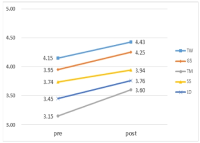
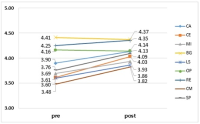
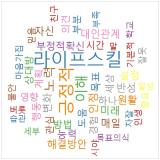


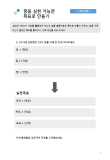

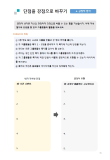
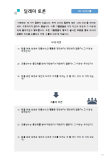




This study aimed to explore the psychological factors affecting sports performance and their purposes as perceived by adolescent athletes. Study data were collected by conducting an open-ended survey with 232 student athletes from adolescent athletes in S city. The collected data were categorized using content analysis, which was conducted twice to explore the psychological factors affecting sports performance and their purposes. From 537 answers, 30 performance-affecting psychological factors—including confidence, endurance, effort/dedication, optimal tension, and social support—were identified, and they were classified into five categories: psychological fundamental, mental toughness, motivation, emotional stability, and social relationships. From 588 answers, the purposes of the psychological factors were identified, including performance achievement, motivation enhancement, demonstrating mental toughness, cognitive strategy, confidence increase, emotional regulation, injury prevention, game strategy, and reinforcement cohesion. These performance-affecting psychological factors and their purposes may serve as a reference to understand how secondary school students perceive the relationships among various psychological factors and the relationship between the psychological factors and performance. This study is expected to inform goal setting and content organization in psychological skills training.

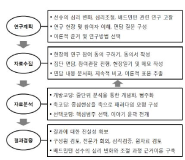
This study was purposed to explore psychological change and regulation process during badminton competition. The data were conducted using group interviews and participation observations who 18 K college badminton players. The data were analyzed using open, axial, and selective coding based on grounded theory method (Strauss & Corbin, 1998). The results were as follows: Open coding results, 89 concepts, 44 subcategories, and 18 categories emerged as psychological change and regulation process during badminton competitions. Axial coding results, the categories are showed structural relationships such as performance, score, psychological momentum, the importance of competition, court environment, physical condition, competition strategy, psychological preparation, past experience, outcome expectation, psychological disturbance, psychological skills, game situation-changing strategy, support-seeking strategy, significant others' behavior, the opponents' behavior, psychological resilience, and maintenance psychological disturbance. Selective coding results, core category of this study was revealed to maintain psychological homeostasis. Environmental context during badminton competitions causes specific situations and events that evoke psychological disturbance. In turn, a player seeks mental and behavioral strategies to maintain psychological homeostasis. There is psychological homeostasis mechanism during badminton competitions for peak performance. Development of proper interest for psychological homeostasis will be improved through this research approach in sport psychology.

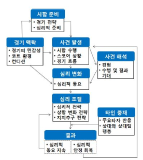
PURPOSE This study explored psychological experiences in long jump competitions and examined the continuity of psychological experiences over time. METHODS A total of 28 adult long jumpers, 18 men and 10 women, were provided data through in-depth interviews. Data on psychological experiences were extraced through inductive content analysis, while continuity by period was analyzed by calculating the response frequency ratio using Excel. RESULTS First, the psychological experience in the long jump competition was categorized as fundamental, competition intelligence, emotional control, and communication capacity experience. Second, in long jump competitions, results showed that jumpers experienced mixed feelings of anxiety and pressure, self-confidence, and concentration in the first period; peer communication and analysis thinking were necessary in the second period; practical intelligence and pressure control were important in the third period; learning ability and creativity were crucial in the fourth period; learning ability and coach communication were applied in the fifth period; and fighting spirit and creativity were present in the sixth period. Third, the psychological experience of long jumpers by period, basicphysical strength was maintained; competition intelligence increased in the second and fourth periods; communication skills increased until the fifth period, and decreased after; while emotional control decreased. This reflects the contextual changes over time andthe change in competition records owing to that. CONCLUSIONS In the long jump competition, psychological experience changes by period and affects competition records. This study will contribute to further understanding of psychological continuity.